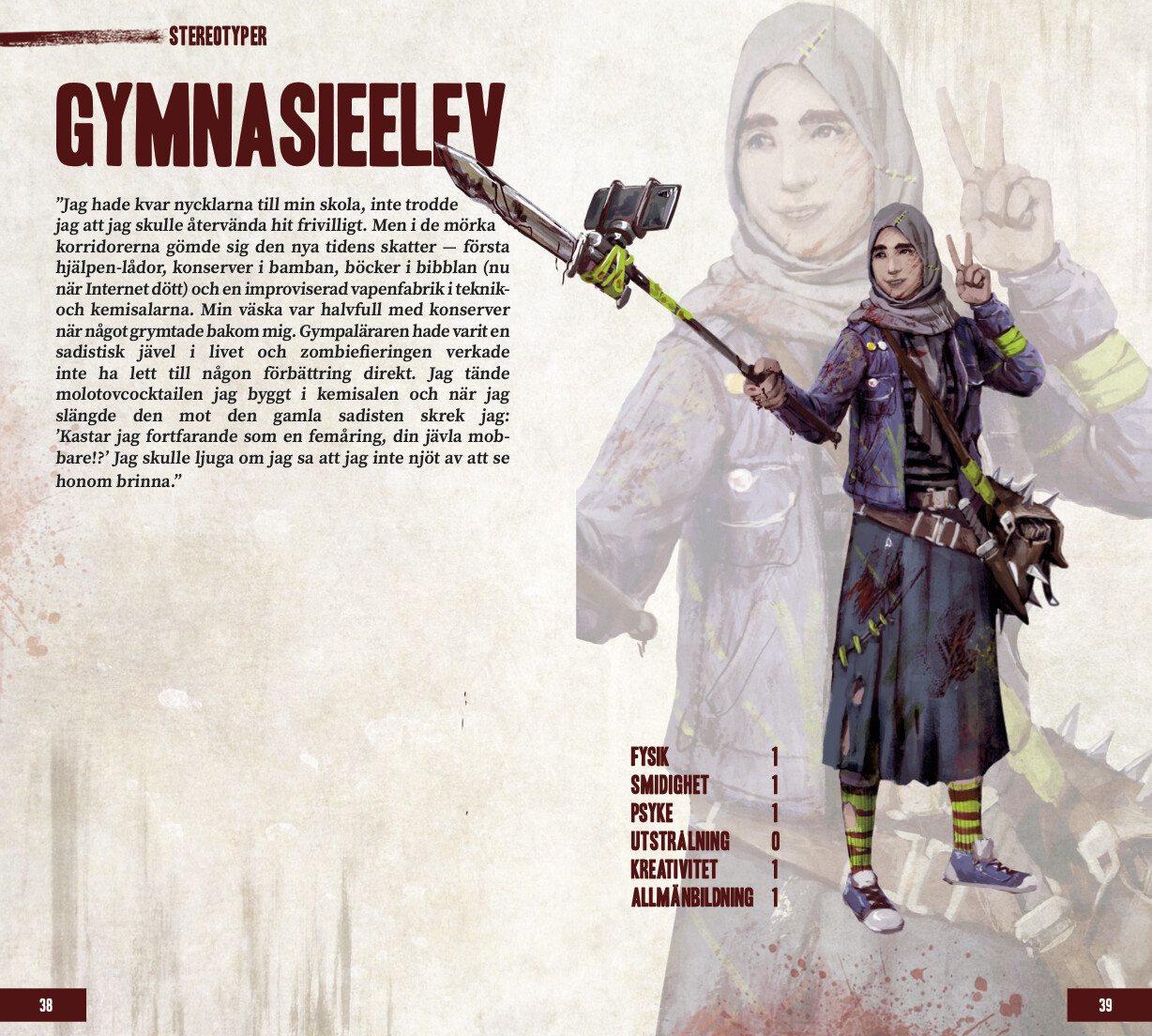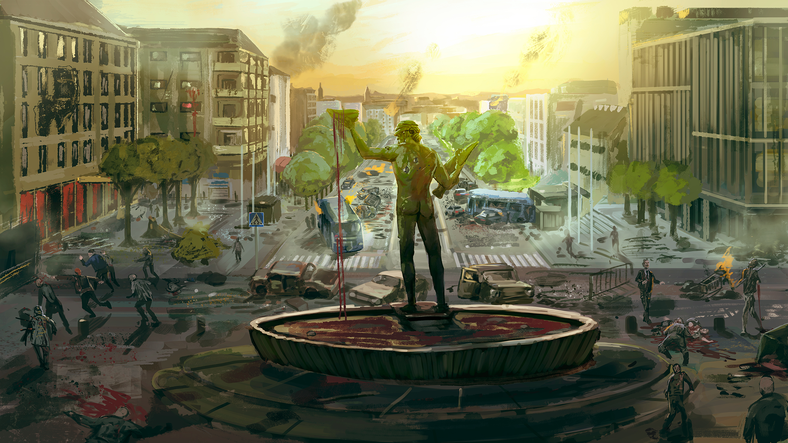Making a character in Skjut Dom I Huvudet

Skjut Dom I Huvudet ("Shoot Them in the Head") by Antiprenör (published by Vildhallon) is a Swedish zombie survival RPG from 2020, wonderfully designed to look like a VHS cassette. I have the Kickstarter limited edition that even comes in one of those plastic cases, manually splattered with fake blood. I bought it simply because of the presentation, and I have no idea what the system is like. All I know is that it takes place in modern-day Gothenburg and is very clearly made by someone from that city. I'll do my best to translate the phrases and names of stats and stuff to English, but it will of course lose some of its tone in the translation. We'll see. Let's begin.
Creating a Survivor
1. Stereotype
You begin creating a character by picking one of the seven Stereotypes listed: Activist, Homeless, Firefighter, High schooler, Criminal, Priest/Religious Leader, and Veterinarian. True to my habit, I will randomize this choice, so I pick up my trusty d7 and roll a High schooler. This grants me a preset statline for my abilities: Physique 1, Agility 1, Psyche 1, Charisma 0, Creativity 1 and General Knowledge 1. This is the number added to a d20 roll when making tests, trying to get equal to or greater than a certain value, depending on the challenge.

The stereotype description:
I still had the keys to my school, I never thought I'd return here willingly. But in the dark corridors I found the new world's treasures—first aid kits, canned food in the cafeteria, books in the library (now that the Internet died) and an improvised arms factory in the chemistry lab. My bag was half-full with cans when I heard grunting behind me. The PE teacher had been a sadistic prick in life, and the zombification didn't improve anything. I lit my molotov cocktail and when I threw it at the old sadist I yelled: 'Do I still throw like a five-year-old, you fucking bully!?' I would lie if I said I didn't enjoy watching him burn.
Advantage: Student
As a high schooler, I get an advantage in that I'm a student and have a greater chance than others of having deeper knowledge in certain fields or tasks. Examples include welding, growing food or brewing beer. Whenever I want to figure out if I know more about a certain thing, I test General Knowledge and on a success, I know the theory of it, but perhaps I won't automatically succeed on the practical part.
Iconic weapon
Every stereotype has an iconic weapon. The activist get a slingshot, the veterinarian a makeshift axe made out of a horse femur and jawbone. I get a selfie stick spear. Just add a knife and duct tape. Can be thrown.

2. Experience
My stereotype lists a few possible experiences that also work as skills. They add a bonus to my die roll if it's reasonable to believe that they would be useful in the situation at hand. The game suggests picking one or making a new one up, but I'll roll for it. There are four example experiences, and I get 1: Coded my own mobile game and hacked the school computers to fix my grades. Alright, so I'm tech-savvy and can hack and work computer systems, should they be powered up and in our way. I'm also probably not a top student and have no qualms about cheating to get where I need to be. Good to know.
3. Equipment
The high schooler stereotype gets the following equipment: padlock, solar-powered laptop, condoms, cigarettes and extra clothes. Personally I would love for this to be a roll table, but I think this isn't that kind of game.
4. Memory
Similar to Experience, the Memory is a formative event that I can bring up in play to explain why I would have extra knowledge or skills in a certain situation, while also fleshing out my character's story and personality. Each stereotype is given a few suggested sparks to come up with your own memories, and it's suggested that they'd be detailed rather than vague. I roll a d3 and get When I was bullied.... The idea is to flesh this out and tell a short story about this dark period in my life and what it led to, and possibly how I handled it or how it ended. If I meant to actually play this character, or if I was in a group where I could more easily connect my character to the others', I'd do it. But for now I'll leave it at that.
5. Further details
The stereotype also provides a couple of random tables to give extra individuality and personality to the character. This is the type of stuff I like, maybe I don't have good enough imagination to come up with stuff from nothing, or I just prefer to be surprised and work with what I get. I roll 6d6, and get this: My name is Abdi, I'm very religious and currently into animal rights. I would never admit that I dress like a hipster. I get two extra items: a Bluetooth speaker and a razor blade. Both could come in handy in the zombie apocalypse, I feel. Probably my faith, too.
6. Secondary abilities
My base abilities/stats give me some other good stuff to keep noted. Quite a lot, it seems. But maybe it's just because I'm so used to rules-light games:
- Stamina is Agility+Psyche+3, so 5. This is the stat that soaks damage before I take physical damage to Endurance, or mental damage to Stability. These are explained later in this chapter. An optional rule is that I can spend a point in Stamina to kill a nearby zombie, just like that.
- Endurance, is basically Hit Points. How much I can get my ass kicked before I die. I begin with Physique+7 in Endurance, so 8. I don't know if this is a lot or a little, I will assume average.
- Protection is how much damage my clothing and gear can take before it hurts me. It's the same as my Agility, so 1. Doesn't seem like a lot.
- Stability is the level of my mental well-being. Seeing or experiencing scary or traumatic stuff damages this stat. Like Endurance, Stability is only lowered once Stamina is down to zero. Stability begins at Creativity+7, so 8.
- Psyche is a core ability and is just part of this chapter to explain that it works like Protection, but for mental damage. So before anything "hits" my Stability, my Psyche stat absorbs a bit of it.
- Initiative. In combat, you roll d20 and add this number to see who goes first. It's (Physique+Agility)/2, so 1.
I think that's it.

7. Relationships
Before we begin playing, I need to give my character a relationship with an NPC, which will also function as a memory that I can bring up as a possible skill in a pinch. There is a list of suggested memories from which I'm supposed to pick two. I will roll for it, because that's what I do. 2d12 gives me the following connections: My chronically ill mother who needs medicine to survive, and my colleague (I guess classmate) who always tried to diss me in the cafeteria. These are great, and I think can be easily brought up in play. My mother is someone I need to go fetch supplies for, especially medicine, which will bring us to hospitals and drug stores and other adventure sites. And my old bully could be a recurring antagonist, and someone I could easily tie into the memory I rolled, about me being bullied. Will there be revenge? Or redemption? Time will tell. I can see both of these being distractions from studying and the reasons for my bad grades that I had to hack the system to fix.
Relationships with other PCs
There's also a list of possible connection to the rest of the PCs in the group, but since I'm the only one it doesn't really make sense to use these. Or hell, I'll do it anyway just to see what we get. Let's say we have two other PCs. I roll 2d10 and get 5 and 9: You would give your life for this person and A person you've seen from a distance in many different contexts but never got to know. The first one is a very strong one, and it would probably have to be a family member of some kind. The second one, I feel, is easier to justify but not nearly as powerful. Still fun, though.
8. Moral Compass
This is an interesting section. It talks about how the game will challenge and possibly change the characters' morals, and that it's important to have the characters compromise and fail to live up to their conviction, and to show that this is a big issue for them. "None of your characters are psychopaths (yet), so to harm or kill other humans is not something that comes easily." It then provides a short list of schools of ethics, I guess, that you can assign to your character. I'll roll a d4 and learn that Abdi is a Utilitarianist/consequentialist. So to him, it's always a question of what action will have the most beneficial consequences for as many as possible. This, although extremely simplified, is actually a very good guideline for playing my character. Something to get back to whenever a difficult situation comes up. Also, probably, how he justifies cheating by manipulating his grades.
Summary
So I play Abdi, a deeply religious, utilitarian high schooler with a passion for animal rights trying to find meds for his sick mom while avoiding his bully. Proficient with computers and tech, he carries a selfie stick spear, a razor blade and a Bluetooth speaker. I can see him!